RESOURCES FOR THE STUDY OF COMICS & GRAPHIC NOVELS
JOURNALS
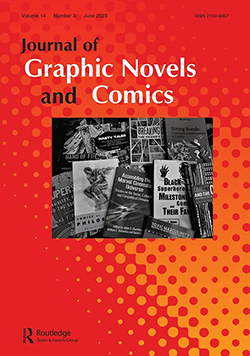
Journal of Graphic Novels and Comics (https://www.tandfonline.com/journals/rcom20)
JGNC covers all aspects of the graphic novel, comic strip and comic book focusing primarily, but not exclusively, on the twentieth and the twenty-first centuries. The emphasis is on the production and consumption of comics in their cultural, institutional and creative contexts. The journal aims to reflect not only standard forms such as the superhero and other genres of the comic book, but also the increasing interest in modern forms and emerging genres of the comic, for instance, medicine, psychology and autobiography. Our scope is international, covering not only English language comics but also worldwide comic culture, recently featuring articles about European, Indian, Japanese and Korean comics.
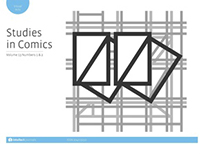
Studies in Comics (https://www.intellectbooks.com/studies-in-comics)
Studies in Comics aims to describe the nature of comics, to identify the medium as a distinct art form and to address the medium's formal properties. The emerging field of comics studies is a model for interdisciplinary research and this peer-reviewed journal welcomes all approaches and methodologies. Its specific goal, however, is to expand the relationship between comics and theory and to seek to articulate a “theory of comics.”

International Journal of Comic Art (http://www.ijoca.net/)
International and multidisciplinary in scope, IJOCA aims to publish scholarly and readable research on any aspect of comic art, defined as animation, comic books, newspaper and magazine strips, caricature, gag and political cartoons, humorous art, and humor or cartoon magazines. A typical issue includes about 500-700 pages, averaging 30 articles and more than 200 illustrations. More than 50 countries of every continent have been subjects of articles. Additionally, IJOCA features editorials, book and exhibition reviews, bibliographic essays, resource columns, a portfolio of cartoons worldwide, and interviews.
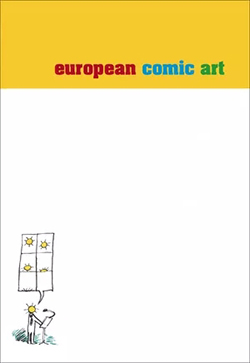
European Comic Art (https://www.berghahnjournals.com/view/journals/eca/eca-overview.xml)
European Comic Art is the first English-language scholarly publication devoted to the study of European-language graphic novels, comic strips, comic books and caricature. The journal emphasizes coverage of work from across Europe, including Eastern Europe.
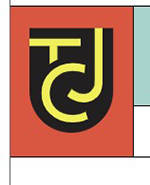
The Comics Journal (https://www.tcj.com/)
TCJ considers itself “The Magazine of Comics Journalism, Criticism and History.” Feature stories are available online at their site, but access to their digital archive requires a subscription. It is published by one of the most respected publishers of graphic novels, Fantagraphics.
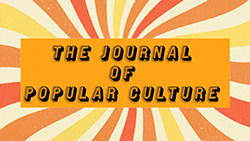
Journal of Popular Culture (http://www.journalofpopularculture.com/)
TJPC continues to break down the barriers between so-called "low" and "high" culture and focuses on filling in the gaps that a neglect of popular culture has left in our understanding of the workings of society.
Image [&] Narrative (http://www.imageandnarrative.be/) ! Open Access !


ImageTexT — Interdisciplinary Comics Studies (https://imagetextjournal.com/) ! Open Access !
The objective of ImageTexT is to advance the academic study of an emerging and diverse canon of imagetexts. Chief among these are comic books, comic strips, and animations, but also represented are illustrated fiction, children’s picture books, digital-concrete poetic forms, visual rhetoric, etc. Any work or works, tradition, school of thought, or critical method that foregrounds the intersections, interrelations, and disjunctions between text and image is an appropriate subject for inquiry and debate in these pages.

SANE Journal: Sequential Art Narrative in Education (https://digitalcommons.unl.edu/sane/) ! Open Access !
SANE Journal publishes peer-reviewed articles from researchers and practitioners from a variety of disciplines seeking to add significantly to the global knowledge associated with all aspects of graphica (comics, graphic novels, and its related forms) and education. Reviews of sequential art narratives and their associated scholarship as it pertains to teaching or learning through them are also published, as are resources designed to help educators of all levels integrate comics texts into their classrooms and libraries.
inkt/art (https://inktart.org/) ! Open Access !

Anthologies and scholarly treatments devoted to the work of women in the medium of comics are not new, yet women remain a minority in the field. Women have a presence that is less visible; a voice that is less heard; their work carries themes that are less critically explored, and they inherit and continue to shape a politics of representation that is weighted differently in the historically male-dominated field of image and text. This is not a journal whose goal is female empowerment; instead, its purpose is intellectual and aesthetic edification: we hope to expose comics creators, scholars, and readers of all genders to ideas and art, and ideas about art.

The Comics Grid: Journal of Comics Scholarship (https://www.comicsgrid.com/) ! Open Access !
TCG:JCG is an open-access, researcher-led, peer-reviewed academic journal. The journal aims to publish original and specialized contributions to the field of comics scholarship from multidisciplinary and media-specific perspectives. TCG aims to promote innovative comics scholarship where the writing is energetic and theoretically and interpretively bold, and that presents specialized knowledge in accessible and engaging forms.
ONLINE RESOURCES
Bonn Online Bibliography for Comics Research (https://www.bobc.uni-bonn.de/)
This is an international bibliographic database for scholarly literature about comics, graphic novels, manga and related fields. Not included so far (with a few exceptions) are articles from fan magazines, newspapers and blogs.
The Cartoonists of Color, Queer Cartoonists, and Disabled Cartoonists Databases
https://cartoonistsofcolor.com/ https://queercartoonists.com/ https://www.disabledcartoonists.com/
These searchable databases were created and are maintained by cartoonist MariNaomi as a way to spotlight marginalized comics creators.
Comic Book Plus (https://comicbookplus.com/)
Comic Book Plus calls itself “the original and still the premier site to legally read and download Golden and Silver Age comic books. But there is now so much more with our addition of fanzines and our Non-English section.”
Comic Book Resources - CBR - (https://www.cbr.com/)
CBR states that its goal is “to supply anyone interested in comic books, superheroes, and geek entertainment with information and resources that will provide a greater appreciation and investment in the medium (whether you’re a lifelong comic book enthusiast or a casual superhero movie fan).”
Comics and Graphic Novels (https://www.nypl.org/blog/subject/1092
Blog posts on this subject. Coming from the staff of the New York Public Library.
Comics and Graphic Novels Blog (https://www.theguardian.com/books/booksblog+comics)
Blog entries from the Book Blogs of The Guardian (UK)
Comics Forum (https://comicsforum.org/)
The Comics Forum website regularly publishes articles on a wide range of topics. The site also hosts regular columns on comics scholarship in Germany, Manga Studies and a monthly news review. Comics Forum provides a range of scholarly resources, including a directory of comics scholars, documentation from affiliated conferences and a selection of digital texts.
The Comics Reporter (https://www.comicsreporter.com/)
Tom Spurgeon's site, full of comics news, reviews, interviews and commentary. Spurgeon was an extraordinary presence in American comics, as a chronicler of the medium and the industry around it, a critic, a convention organizer, and a nexus point for the comics community. Although he died in 2019, his site is still live.
ComicsResearch.org (http://comicsresearch.org/)
ComicsResearch.org primarily covers book-length works about comic books and comic strips, from "fannish" histories to academic monographs, providing detailed information and guidance on further research.
Comics Research Bibliography (http://www.internationalcomicartsforum.org/comics-studies-bibliography.html)
This resource is intended to highlight the recent work in English-language comics scholarship produced by experts working in diverse departments, fields, and institutions. The bibliography is organized in two sections: one for monographs and edited collections, and another for peer-reviewed journal articles and essays from scholarly anthologies not primarily devoted to comics.
Comics Worth Reading (https://comicsworthreading.com/)
This is the longest-running independent review site online that covers all genres of comic books, including graphic novels, independent press, alternative, manga, graphic memoir, superheroes, and mainstream.
ComiXology (https://www.comixology.com/)
ComiXology, a subsidiary of Amazon, is a cloud-based digital comics service. With content from over 125 publishers as well as thousands of independent creators from around the world, comiXology provides an unrivaled library of comic books, graphic novels, manga and bandes dessinées.
The Digital Comic Museum (https://digitalcomicmuseum.com/)
The mission of The DCM is to provide as close to a free resource as possible where users can easily download public domain golden age comics without the need to ask or worry about searching the net for them.
Grand Comics Database (https://www.comics.org/)
The GCD Project intends to be the most comprehensive online comics database for comic readers, collectors, scholars and professionals." This fully searchable and sortable database includes information on creator credits, story details, and other information useful to the comic-book reader, fan, collector, and scholar. It now has over 1,000,000 scans of covers.
Graphic Medicine (https://www.graphicmedicine.org/)
Graphic Medicine is a site that explores the interaction between the medium of comics and the discourse of healthcare.
Graphic Novel Resources (http://graphicnovelresources.blogspot.com/)
Blog by Stergios Botzakis, Associate Professor of Adolescent Literacy at the University of Tennessee. It contains links and information about graphic novels for anyone interested in reading them.
Visual Language Lab (http://www.visuallanguagelab.com/)
Created by Neil Cohen, the Visual Language Lab consists of an international mix of scholars from all levels of scholarship. They all focus on research that takes a linguistic approach to graphics.
Wonderfully Vulgar — British Comics 1873–1939 (http://www.wonderfullyvulgar.de/)
This online exhibition presents a selection of British comics from the 1870s (the Ally Sloper era) to the 1930s (knockabout comics). The phrase "wonderfully vulgar" used in the exhibition title is taken from an interview in which Charlie Chaplin recalled his pleasure in reading comics as a boy in 1890s London. The exhibition is based on a collection of around 5000 historical British comics housed in the Library of the University of Oldenburg in Germany.